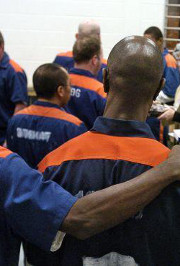Nigeria (MNN) — The Christian Association of Nigeria (CAN) wants the Federal Government to pronounce the radical Islamic sect, Boko Haram, as a foreign terrorist group.
As if to bolster their request, the International Criminal Court just released a report concluding that the Boko Haram has committed "Crimes Against Humanity." It's what CAN needed to get redress in the courts and not on the streets.
The findings of the ICC were underscored by yet another attack on Sunday, November 25, in Kaduna State. Nigerian officials say at least 11 people were killed and about 30 were injured around noon. A military spokesman says a bus laden with explosives rammed into St. Andrew Military Protestant Church in a barracks, and 10 minutes later a car parked just outside the church exploded as people fled the first blast. The following day, gunmen assaulted police headquarters in Abuja, Nigeria's capital, engaging police in a vicious battle.
For those working alongside the Christians in Nigeria, the report is well-timed. Todd Nettleton, spokesman for Voice of the Martyrs USA, says, "We've seen the attacks on churches; we've seen the attacks on government buildings. We've seen and heard their ideology of wanting a Sharia state, wanting to eliminate the so-called ‘Western influence,' which also includes Christianity in Northern Nigeria."
Although the effort to rid Nigeria of Christians started nearly a decade ago, the attacks of the last three years have claimed an estimated 3,000 lives. Boko Haram means "Western education is forbidden." The sect was founded in 2001 and flourished until 2009, when it went underground. It soon resurfaced, better organized and better funded with money tied to Al Qaeda.
To that end, the ICC's Prosecutor clearly found that Boko Haram has "attacked religious clerics, Christians, political leaders, Muslims opposing the group, members of the police and security forces, 'westerners,' journalists, as well as UN personnel. The group has also been accused of committing several large-scale bombing attacks against civilian objects, including deliberate attacks against Christian churches and primary schools."
Pressure from the international community would play a vital role in how fast the response would be. However, says Nettleton, "One of the challenges that we have here in the United States is that our government will not call Boko Haram a terrorist group. Now the International Criminal Court says there's reason to believe they've committed crimes against humanity."
Because the ICC report says one thing while the U.S. government (which is currently engaged in a war on terror) says something else, Nettleton adds: "It's a very frustrating message to those of us who kind of know what's going on, because it reflects, really, a blindness to the situation and to the reality on the ground in Nigeria."
Nettleton goes on to say that the U.S. response avoids the religious question entirely. "Their [Boko Haram] motivation for those crimes is obviously radical Islam and pushing a Sharia agenda, and yet our government says that Boko Haram is the result of ‘economic imbalance' in Nigeria and ‘lack of educational opportunities.'"
However, the ICC's Prosecutor concluded that the Boko Haram's calls for genocide and subsequent attacks on specific groups amount to crimes against humanity under the Rome Statute, i.e. "(i) murder under article 7(1)(a) and (ii) persecution under article 7(1)(h) of the Statute."
As a result, a Jubilee Campaign spokesperson says, "We call on the ICC to move promptly to the 3rd phase of its preliminary examination. As the phase 3 process evaluates the viability of national attempts to prosecute Boko Haram, Nigerian authorities should fully cooperate and make all reports and past investigations available to the ICC."
Nettleton agrees. "What this report means is now the International Criminal Court is paying very close attention. They're watching to see what the Nigerian government does to respond to this situation and how they're going to handle or try to solve this problem with Boko Haram."
Here's what it boils down to for Christ followers in Nigeria, Nettleton explains: "As you think about the experience of going to church, and you think about the experience of trying to reach out to your community, obviously if your first concern has to be 'is this person is a threat to my personal safety,' that affects how you're going to spread the Gospel. That affects how the church is going to operate."
VOM has a long history alongside Christians in Nigeria, helping Boko Haram's victims with assistance, medical care, and more. Nettleton says while that's helpful, the one thing the survivors ask for is prayer. "Jesus calls us to love our enemies and to pray for those who persecute us. That's a very hard standard when bombs are going off in churches every Sunday. We need to pray for the hearts of our Nigerian brothers and sisters to remain soft to the people around them, and to remain passionate about spreading the Gospel."

